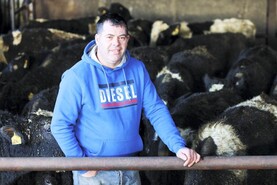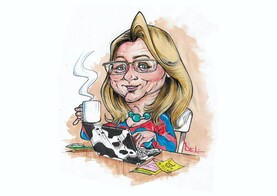Living less than seven miles from the border with Northern Ireland, dairy farmer Gerard Lynch remembers clearly the day that the Brexit referendum result was announced.
“I remember coming down to milk that morning and just turning on the television before I went out, thinking they would have voted to stay,” he recalls. “I was shocked.”
Gerard is the third generation of his family to farm in Butlersbridge, Co Cavan, where he lives with his wife, Susan, and their children, Conor (12), Sean (10) and Niall (seven), as well as his mother, Madge.
Milking approximately 60 cows, he supplies Lakeland Dairies, with his milk delivered to the creamery in either Killeshandra or Bailieborough. But even though it’s not crossing the border, he is still concerned that Brexit will impact on farmers’ incomes in the area.
“You would have a fair worry in the short term if [Brexit] went through,” he explains. “I’d say it will affect price and the market; it’s a lot more volatile at the minute because of it, because you have all this unknown and people are much more cautious.”
Where Gerard feels a lot more exposed, however, is in selling on stock. At present, he rears and sells-on dairy replacements, with the vast majority of these going to buyers in Northern Ireland.
“I probably sell around 30 milking animals a year; if you take that maybe 90% of them are going to Northern Ireland, it’s quite significant,” says Gerard, who explains that his last buyer came from Strabane for the second year in a row.
Post-Brexit, however, he fears that this market could dry up.

Dairy farmer, Gerard Lynch, Inishmore, Butlersbridge, Co Cavan. \ Ramona Farrelly
“If there’s a complication or if there’s some sort of a tariff, maybe that guy who is coming from Strabane up to me to buy those stock may no longer have an interest,” he suggests.
Gerard also sells on similar numbers of beef calves in southern Ireland, but even though they don’t cross the border, he reports that prices are back €40-€50/head on last year.
“I would attribute a certain amount of that to Brexit,” he says. “It’s not all just the beef trade; you have a man that’s possibly thinking of buying a calf but at the back of his mind is Brexit and where is the price of beef going to be when this calf is finished?”
The Lynches also have a self-catering property, which is often rented out by anglers. About a third of bookings come from the UK, and while he has not noticed any impact yet, he does have concerns that a hard Brexit could hit.
“You have currency,” he states as one example, “there’s talk about drivers’ licences, people on an English licence won’t be able to drive in southern Ireland; if you had things like that, it might put people off coming.”
Living so close to the border, Gerard explains that many farmers in the area would often source machinery or use a contractor based in Northern Ireland.
“I could have a contractor, he’s only 30 minutes away from me, but yet he’s across the border. That’s how close I am. That’s regular in Cavan,” he says.
Hard border
Indeed, he says that among locals, it’s the fear of returning to a hard border and checkpoints that is the chief concern for many.
“That would be the biggest thing I would find people in Cavan talking about,” he says.
“If I was going from my house to Clones, which is in southern Ireland, I cross the border. I go into Northern Ireland and I come out of Northern Ireland to get to Clones… you don’t think about it.”
Some of them who would have bought dairy heifers off me, they all said they voted to stay
And speaking to other farmers across the border, it seems there is little enthusiasm for Brexit.
“Some of them who would have bought dairy heifers off me, they all said they voted to stay,” says Gerard. “Some of them would even tell you about people who voted to leave, but now they have changed their mind.”
However, he reports a certain level of fatigue is setting in as the uncertainty continues.
“It is topical and at the same time people are getting tired of it. There seems to be nothing else nearly all day, every day. It’s like a moving target, it keeps changing, it’s going one way this week and going another way next week,” he says.
“You’d be conscious of it, but you have to park it to a certain extent because there’s nothing you can do.”
Living less than seven miles from the border with Northern Ireland, dairy farmer Gerard Lynch remembers clearly the day that the Brexit referendum result was announced.
“I remember coming down to milk that morning and just turning on the television before I went out, thinking they would have voted to stay,” he recalls. “I was shocked.”
Gerard is the third generation of his family to farm in Butlersbridge, Co Cavan, where he lives with his wife, Susan, and their children, Conor (12), Sean (10) and Niall (seven), as well as his mother, Madge.
Milking approximately 60 cows, he supplies Lakeland Dairies, with his milk delivered to the creamery in either Killeshandra or Bailieborough. But even though it’s not crossing the border, he is still concerned that Brexit will impact on farmers’ incomes in the area.
“You would have a fair worry in the short term if [Brexit] went through,” he explains. “I’d say it will affect price and the market; it’s a lot more volatile at the minute because of it, because you have all this unknown and people are much more cautious.”
Where Gerard feels a lot more exposed, however, is in selling on stock. At present, he rears and sells-on dairy replacements, with the vast majority of these going to buyers in Northern Ireland.
“I probably sell around 30 milking animals a year; if you take that maybe 90% of them are going to Northern Ireland, it’s quite significant,” says Gerard, who explains that his last buyer came from Strabane for the second year in a row.
Post-Brexit, however, he fears that this market could dry up.

Dairy farmer, Gerard Lynch, Inishmore, Butlersbridge, Co Cavan. \ Ramona Farrelly
“If there’s a complication or if there’s some sort of a tariff, maybe that guy who is coming from Strabane up to me to buy those stock may no longer have an interest,” he suggests.
Gerard also sells on similar numbers of beef calves in southern Ireland, but even though they don’t cross the border, he reports that prices are back €40-€50/head on last year.
“I would attribute a certain amount of that to Brexit,” he says. “It’s not all just the beef trade; you have a man that’s possibly thinking of buying a calf but at the back of his mind is Brexit and where is the price of beef going to be when this calf is finished?”
The Lynches also have a self-catering property, which is often rented out by anglers. About a third of bookings come from the UK, and while he has not noticed any impact yet, he does have concerns that a hard Brexit could hit.
“You have currency,” he states as one example, “there’s talk about drivers’ licences, people on an English licence won’t be able to drive in southern Ireland; if you had things like that, it might put people off coming.”
Living so close to the border, Gerard explains that many farmers in the area would often source machinery or use a contractor based in Northern Ireland.
“I could have a contractor, he’s only 30 minutes away from me, but yet he’s across the border. That’s how close I am. That’s regular in Cavan,” he says.
Hard border
Indeed, he says that among locals, it’s the fear of returning to a hard border and checkpoints that is the chief concern for many.
“That would be the biggest thing I would find people in Cavan talking about,” he says.
“If I was going from my house to Clones, which is in southern Ireland, I cross the border. I go into Northern Ireland and I come out of Northern Ireland to get to Clones… you don’t think about it.”
Some of them who would have bought dairy heifers off me, they all said they voted to stay
And speaking to other farmers across the border, it seems there is little enthusiasm for Brexit.
“Some of them who would have bought dairy heifers off me, they all said they voted to stay,” says Gerard. “Some of them would even tell you about people who voted to leave, but now they have changed their mind.”
However, he reports a certain level of fatigue is setting in as the uncertainty continues.
“It is topical and at the same time people are getting tired of it. There seems to be nothing else nearly all day, every day. It’s like a moving target, it keeps changing, it’s going one way this week and going another way next week,” he says.
“You’d be conscious of it, but you have to park it to a certain extent because there’s nothing you can do.”







 This is a subscriber-only article
This is a subscriber-only article









SHARING OPTIONS: